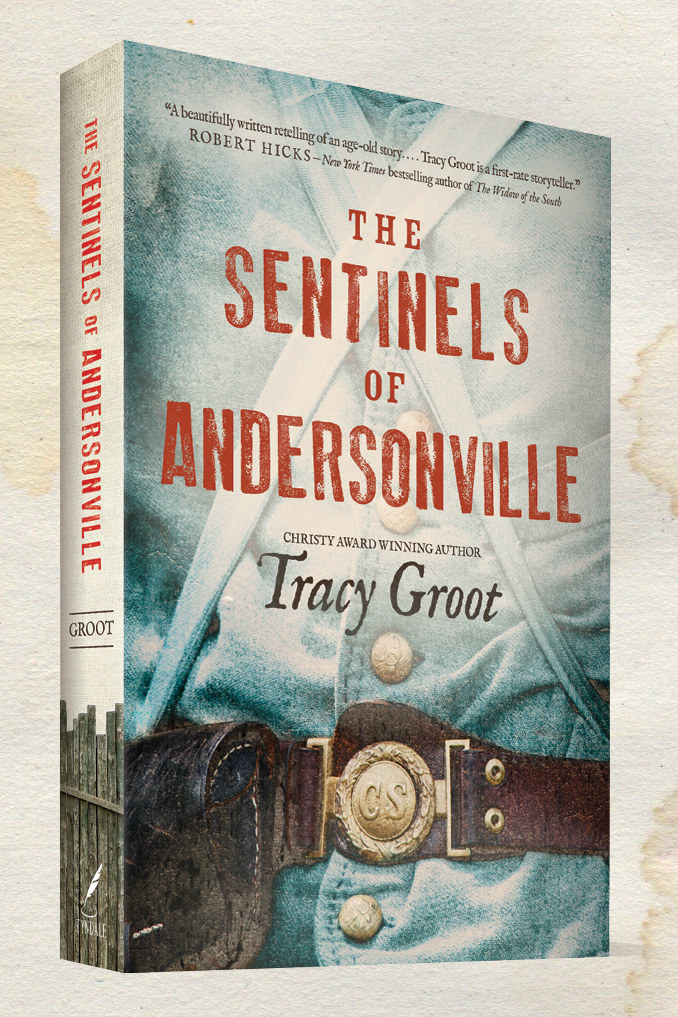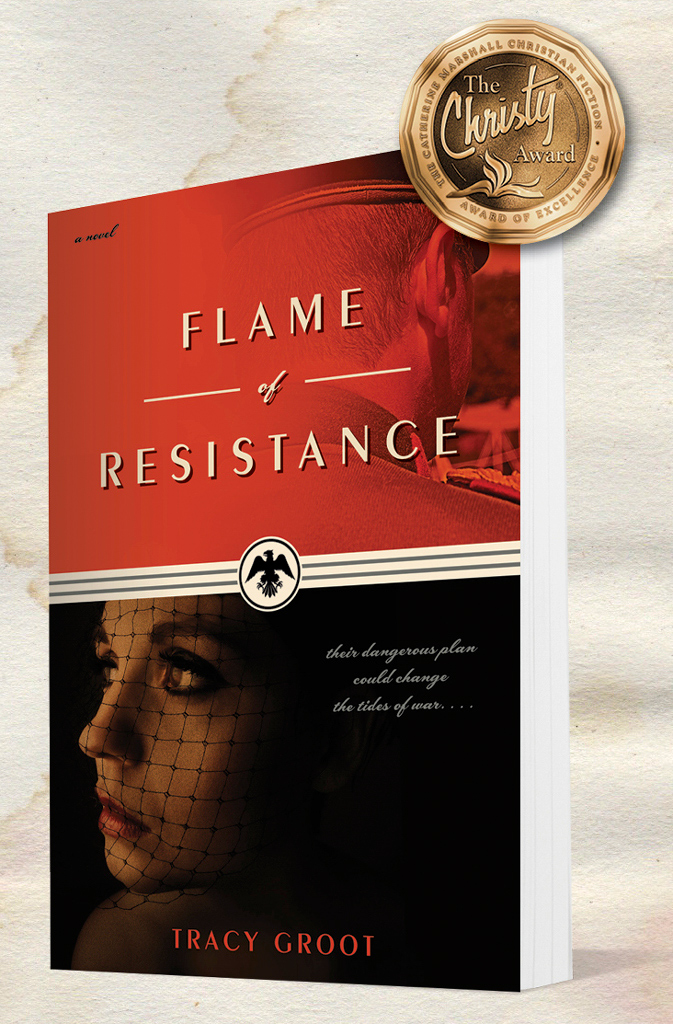Maggie Bright (36 page)
Authors: Tracy Groot
Tags: #FICTION / Christian / Historical, #FICTION / Historical

Experience history like never before with more great fiction from
Tracy Groot
“We are rebels, are we not? Then let us rebel against what is not us.”
“We are rebels, are we not? Then let us rebel against what is not us.”


Their dangerous plan could change the tides of war.
Their dangerous plan could change the tides of war.
Turn the page for an exciting excerpt from
Flame of Resistance
.

THE SUN CAME
warm through the plexishield. The shield squeaked as Tom wiped a patch of condensation. He was no good with words, and he didn’t have to be. Plenty of aviators said it for him. One talked of slipping the surly bonds of earth, and of sun-split clouds. Another spoke of rarefied splendor. “Untrespassed sanctity” was a favorite, and those were the words he’d use to tell the folks.
Untrespassed sanctity,
he’d say of the English Channel, and of the gut-thrum of his aircraft, of the daily sorties to France, and his placement in the V. It never got old. It was untrespassed. Maybe not invincible, but so far, on his watch, untrespassed.
I know that I shall meet my fate somewhere among the clouds above; those that I fight I do not hate, those that I
—
“Angel flight, this is lead.” Captain Fitz finally broke radio silence. “Rolling in.”
The five Thunderbolts approached the target area, flying in lovely V formation. Tom would ransack his vocabulary for a different word than
lovely
if talking with the guys, but the new guy from Molesworth stayed on his wing pretty as pie. Someday he’d like to hear a liberated
Frenchman say,
There I was, getting beat up by a Nazi; we look up and see this lovely V . . .
“One and two, take targets on the right. Three and four
—”
“Captain! We got movement
—”
Antiair flak slammed her belly, blew a hole in the front of the cowling. Tom barely knew he was hit before oil pressure plummeted. “Mayday
—this is Angel three. I’m hit! I’m hit.”
“Angel three, can you make it back?”
“Pressure gauge says no, flight lead. I’m going in.”
“Copy. We’ll cap the area.” Then, “Good luck, Tom.”
“Good luck, Cab,” another echoed.
“Guts and glory, Cabby,” called another.
Bullets stitched the plane as he peeled off the target. Smoke filled the cockpit, burnt oil singed his nostrils. She was flagging the second she was hit, but he gripped the stick and pulled back to get as much height as he could before bailing.
He tried for a look at the ground but couldn’t see through the smoke. Where was he? Too charmed by rarefied splendor and the alignment of his wingman to
—
“Normandy,” Tom coughed. Northeastern Normandy.
Flak exploded and pinged, black patches pockmarked the sky, and as Tom gained altitude, he heard a conversation in the debrief room.
Then Cabby got hit, and that was it, the whole ground opened up on us.
You capped the area . . .
Stayed as long as we could, sir, but it was too hot.
Where was he in Normandy? Caen? Cabourg? Maybe he could
—
But the old girl jerked, leveled, and he had no hope of circling back to bail in the sea.
Why do you call him Cabby?
He looks like he jumped outta the womb hollering, “Heil Hitler,” but didn’t like us calling him Kraut. So we called him Cabbage.
We called him Cabbage.
I ain’t dead yet, fellas. I am, however, about to reacquaint myself with the surly bonds of earth.
He waved off smoke, snatched the picture of his little brother, and shoved it down his collar. He jettisoned the cowling, and the plexishield broke from the plane in a
whumpf
, popping his ears, sucking his breath.
There were two ways to bail from a P-47 Thunderbolt. Tilt the plane and let it drop you out, or, in what Tom felt was a more stylish way to go, just stand up, rise into the slipstream, let it carry you away . . .
In the midst of our defeat, glory came to the island people, united and unconquerable; and the tale of the Dunkirk beaches will shine in whatever records are preserved of our affairs.
WINSTON CHURCHILL
The evacuation of Dunkirk shines as the greatest military rescue in history. Approximately 340,000 men were saved from certain death or imprisonment by the Herculean efforts of many.
Yet what of those left behind?
Many British and Allied soldiers paid a heavy price to buy time for others to make it home. They defended the retreat by protecting the ever-shrinking corridor to Dunkirk, often fighting down to the last man and bullet until they were killed or taken captive. Thousands of these defenders died. Forty thousand spent five years in captivity.
Forty thousand.
One of these men was John Borland.
John Borland was a Cameron Highlander serving with the 51st Highland Division. He never reached Dunkirk but was forced to hold the line further west. . . . As he was marched away to five years of captivity, Mr. Borland spotted a scrap of paper blowing across his path. He has it still. “It was a biblical text, with the words ‘Don’t give up’ scrawled in pencil, probably by the man who’d dropped it. Those words stayed with me through my time in the POW camps.”
[Borland was asked,] had he ever given up? The answer was unequivocal: “Never.”
ROBERT HALL,
BBC News UK, May 28, 2010
Let this shine, too.

Authors of historical fiction often face conundrums in deciding what words to use for sensitive topics or conditions. I faced such a dilemma in identifying the disability of the young German boy, Erich von Wechsler. I chose to use the contemporary name for his condition, Down syndrome, although at the time he would have been described as a mongoloid. I wanted to make sure readers understood, and I did not want to risk giving offense over what has become, in our society, an offensive term. This condition was specific to the T-4 program; I wanted you to be as astonished as I was when you learned children like him were being experimented on and euthanized.
I have also played with the time line in giving Clare a Revised Standard Version of the Bible, although this version was not published until 1946. Its specific wording of Nahum 2:1 fit perfectly into the image I wanted to develop. I hope careful readers will forgive my artistic license.

Many books are available on the story of Dunkirk. Some of my own favorites include Richard Collier’s classic,
The Sands of Dunkirk
, and
The Miracle of Dunkirk
by Walter Lord. For an in-depth study of the withdrawal of the BEF, check out
Dunkirk: Retreat to Victory
by Major General Julian Thompson.
WRITERS ARE HAUNTED
by the thought that they may forget to thank someone who has contributed to a book in some powerhouse way
—and even small ways are powerhouse. I hope I have forgotten no one. If I have, dinner is on me, next time I see you. (Wait, that sounds fun; maybe I should forget someone on purpose.)
I am indebted to the following folk for the gracious and multitudinous ways they contributed to this book. They did things like: loaned a pile of WWII newspapers, gave a tour of the
MTB-102
, gave tours of privately owned craft registered with the Association of Dunkirk Little Ships, loaned a cottage in which to hole up and write, read the manuscript, steered me in good directions, and answered endless questions. They are: Neil Barber, Alan and Margaret Childs, Susan and Nigel Cole, Terry Crowdy, Alison Hodgson, Melissa Huisman, Alan Jackson, Debbie King, Don Pearson, Trevor and Alison Phillips, Aaron Smith, Elena Studebaker, and Robert John Tough.
Thanks also to Kathy Helmers and Meredith Smith at Creative Trust, dear friends and Core Competencies. Thanks to the talented team at Tyndale, with whom it was an honor once more to create something good. And thanks to my husband, Jack, an implacable encourager and the only man on earth capable of putting up with me. I don’t know how you do it. I’m glad you do.
Finally, I wish to thank my best-friend-cum-research-assistant, Tami Huitsing, who ran off with me to England and France and did the following: took a million photographs, offered invaluable suggestions, tramped all over kingdom come with never a complaint, prevented me from killing a taxi driver, sampled endless tastes of sticky toffee pudding once I’d discovered it, and endured my often-graceless ADD-on-steroids personality for the entire trip with magnificent aplomb. Many best friends have done nobly. You leave them in your sparkling dust.
